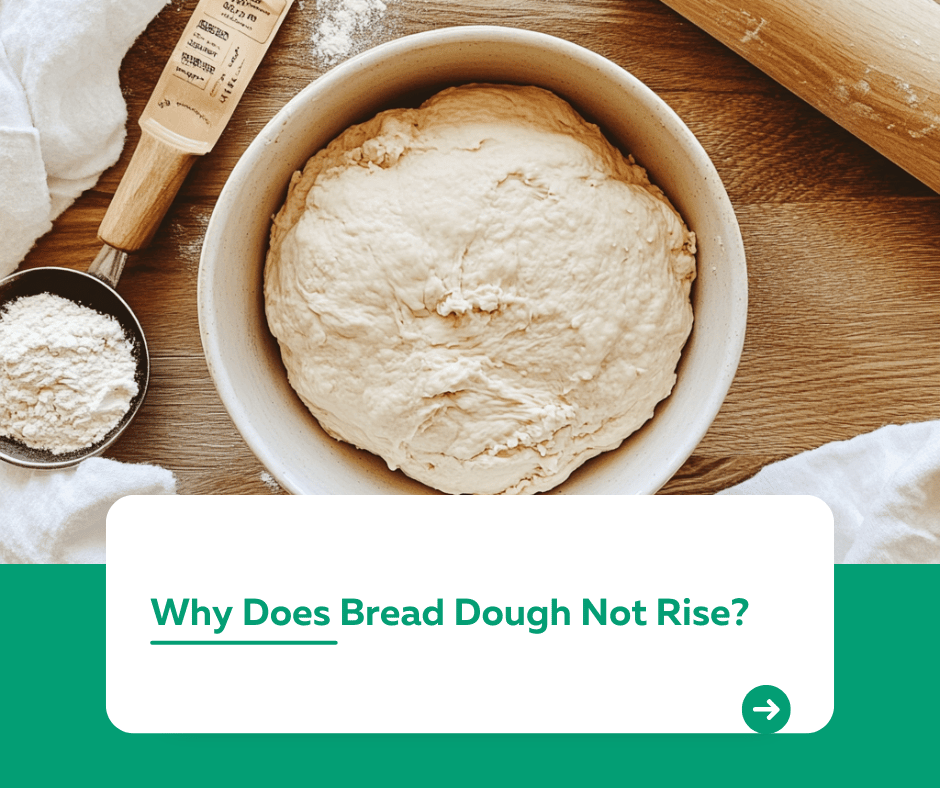
Introduction
“Why does bread dough not rise?”
Nothing is more frustrating than preparing bread dough only to find it stubbornly refusing to rise. Rising is a crucial step in bread-making, as it gives bread its light, airy texture. When dough doesn’t rise, the problem usually lies with the yeast, the environment, or the ingredients. This guide explores common reasons why bread dough doesn’t rise and offers solutions to fix the issue.
1. Yeast Issues
Yeast is the driving force behind dough rising, and problems with it are the most common culprit.
- Expired Yeast: Yeast has a limited shelf life, and expired yeast loses its ability to ferment.
- Improper Activation: If water is too hot or too cold, it can kill or fail to activate the yeast.
- Solution:
- Use fresh yeast and check expiration dates.
- Activate yeast in warm water (about 110°F/43°C) with a pinch of sugar to ensure it’s alive.
2. Incorrect Temperature
Temperature plays a significant role in dough rising.
- Too Cold: Yeast activity slows down in cold environments, causing delayed rising.
- Too Hot: High temperatures can kill the yeast.
- Solution:
- Allow dough to rise in a warm, draft-free area.
- Ideal rising temperature is between 75°F and 85°F (24°C–29°C).
Tip: Use an oven with the light on as a makeshift proofing box.
3. Flour Quality
The type and quality of flour can affect how well dough rises.
- Low Protein Content: Bread flour with higher protein content is ideal for forming gluten, which traps air and helps dough rise.
- Solution: Use bread flour instead of all-purpose flour for better results.
4. Improper Kneading
Kneading helps develop gluten, which provides the structure needed for dough to rise.
- Underkneading: Gluten doesn’t form properly, leading to a dense dough.
- Overkneading: Can overwork the dough, damaging its structure.
- Solution: Knead the dough until it’s smooth and elastic, usually 8–10 minutes by hand.
5. Too Much Salt or Sugar
Excessive salt or sugar can inhibit yeast activity.
- Salt: Direct contact with yeast can kill it.
- Sugar: Too much sugar absorbs water, leaving less for the yeast.
- Solution:
- Add salt and sugar in the correct proportions.
- Mix salt into the flour first to prevent direct contact with yeast.
6. Dough Is Too Dry or Too Wet
The hydration level of dough can affect its ability to rise.
- Too Dry: The yeast can’t spread through the dough effectively.
- Too Wet: The dough becomes sticky and lacks structure.
- Solution:
- Adjust water and flour ratios to achieve a smooth, pliable dough.
7. Rising Time
Impatience can lead to underproofed dough.
- Not Enough Time: Rising can take longer depending on temperature, ingredients, and yeast.
- Solution: Be patient and allow enough time for the dough to rise fully.
Conclusion
When bread dough doesn’t rise, the issue is often a combination of factors like yeast quality, temperature, and technique. By addressing these common problems, you can troubleshoot and achieve a perfectly risen dough every time. Baking bread requires practice, but understanding the science behind rising can make all the difference.
For more baking tips and solutions, visit our Kuestion.com.